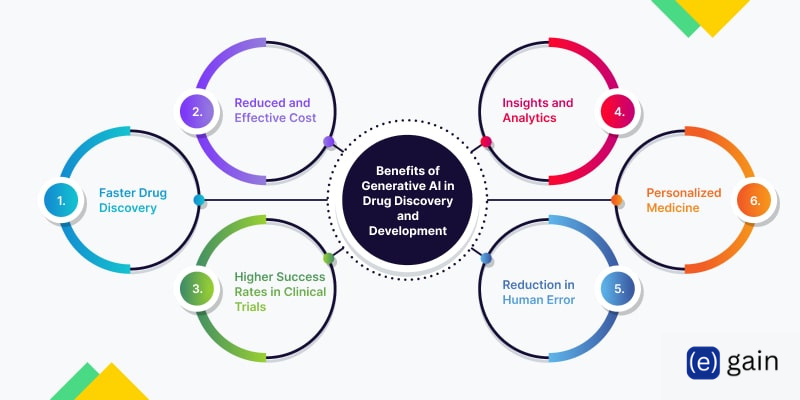
Traditional Drug Discovery and Development Process
The traditional process of drug discovery is lengthy, complex, and expensive. It involves several key stages:
- Target Identification: Finding proteins or genes related to the disease.
- Screening & Optimization: Conducting large-scale screenings to discover potential drug candidates.
- Preclinical Testing: Ensuring safety and effectiveness before entering human trials.
- Regulatory Approval: Submitting for approval before launching in the market.
This process can take years to complete and is fraught with high failure rates. The need for innovation is evident, and Generative AI in drug discovery provides the most promising solution to overcome these challenges.
How Generative AI Speeds Up Drug Discovery
Generative AI uses advanced algorithms to predict, design, and optimize drug molecules more efficiently. Here are the key ways in which Generative AI accelerates the process:
1. Faster Molecule Design and Development
Generative AI rapidly generates new potential molecules by analyzing large biological datasets and identifying relationships between chemical structures and their effects on biological targets. This streamlines early stages like hit identification and lead optimization, improving the likelihood of discovering successful drug candidates.
2. Drug Target Interaction Prediction
Generative AI leverages machine learning to predict how drug molecules will interact with biological targets, minimizing the need for extensive lab experiments. This leads to faster and more accurate identification of drug-target interactions.
3. Higher Success Rates in Clinical Trials
Clinical trials often fail due to unforeseen side effects or ineffectiveness. Generative AI helps optimize drug properties, leading to safer and more effective treatments. It can even predict which patient populations are most likely to benefit from the drug, thus increasing success rates.
4. Repurposing Existing Drugs
Generative AI also excels at identifying new uses for existing drugs by analyzing historical data and drug properties. This not only saves time and resources but also accelerates the process of drug repurposing, especially in urgent situations like pandemics.
5. Streamlining Data Processing
With massive amounts of data generated during drug discovery, such as clinical trial results and genetic information, Generative AI provides real-time insights by managing and processing this data efficiently. This accelerates decision-making and helps researchers identify patterns and correlations that would be missed using traditional methods.
Benefits of Generative AI in Drug Discovery and Development
1. Faster Time-to-Market
Generative AI drastically shortens the time required for drug discovery, with AI-driven processes completing in months what used to take years. By automating key steps like molecule design and data analysis, the time-to-market for new drugs is significantly reduced.
2. Cost Reduction
Traditional drug development can cost billions due to high failure rates and lengthy trial processes. Generative AI reduces these costs by focusing on promising drug candidates and optimizing trial phases to avoid expensive failures. Additionally, drug repurposing helps to further reduce costs.
3. Improved Success in Clinical Trials
By predicting adverse effects and interactions early in the development process, Generative AI helps design safer drugs that are more likely to pass clinical trials, improving the overall success rate.
4. Personalized Medicine
Generative AI paves the way for personalized medicine by designing drugs tailored to specific patient groups. This ensures better treatment outcomes and reduces the likelihood of side effects, enhancing the effectiveness of treatments.
5. Insight-Driven Decision Making
Generative AI’s ability to process and analyze vast amounts of biological and chemical data provides insights that were previously unattainable. These data-driven decisions accelerate the identification of drug targets and potential therapies.
6. Reduction in Human Error
AI-powered systems minimize the risk of human error in drug design, data processing, and clinical trials. This enhances the accuracy of results and improves the overall reliability of the drug development process.
How Generative AI Transforms the Drug Development Pipeline
The potential applications of Generative AI in drug discovery are vast. Pharmaceutical companies can utilize this technology to develop new medicines faster, cut costs, and improve the likelihood of success. Here's how:
Data Gathering and Integration
Generative AI aggregates vast datasets from various sources, including clinical trials, genetic sequences, and chemical compound libraries. This data integration helps create a comprehensive pool of information for drug discovery.
Target Identification
Generative AI analyzes large datasets to identify high-potential drug targets, such as genes or proteins associated with specific diseases. This reduces the time required to find viable candidates for further testing.
Molecule Design
Generative AI suggests new drug candidates by modeling the interactions between chemicals and biological targets. AI can even modify chemical structures to improve efficiency and reduce side effects.
Preclinical Testing
By predicting the behavior of drug candidates in preclinical stages, Generative AI helps scientists avoid testing non-viable candidates, saving time and resources.
Optimizing Clinical Trials
Generative AI can optimize clinical trials by predicting which patient populations are most likely to respond to new treatments. This ensures faster and more accurate trial results, reducing the risk of failure.
Case Study: Insilico Medicine
One example of AI’s potential in drug discovery is Insilico Medicine, an AI-driven biotechnology company that used Generative AI to identify a potential treatment for pulmonary fibrosis in just 21 days—a process that usually takes three to five years. This highlights how Generative AI can reduce both time and costs, transforming the future of drug discovery.
Conclusion
Generative AI is reshaping the pharmaceutical industry by accelerating drug discovery, reducing costs, and improving success rates in clinical trials. For pharmaceutical companies looking to stay ahead of the competition, embracing AI-driven drug discovery is no longer optional—it’s essential.
e-gain Technologies specializes in leveraging cutting-edge technologies like Generative AI to provide innovative solutions for businesses. Contact us to learn how we can help you integrate AI into your drug discovery pipeline and revolutionize your research and development processes.




